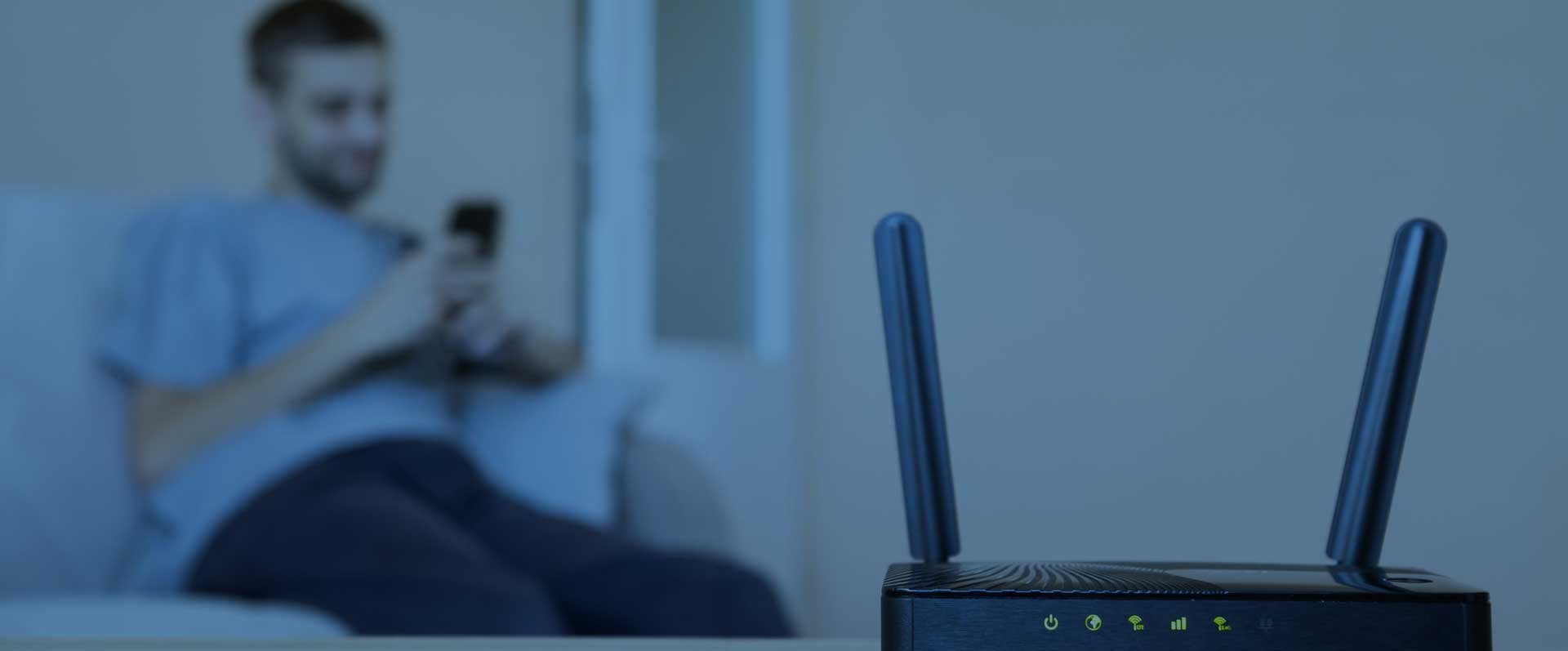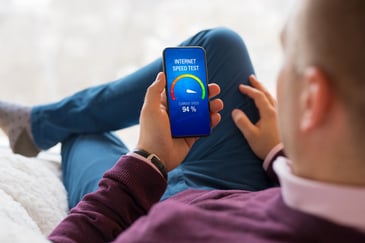No More Router Wars: Conquering WiFi Interference in Apartment Buildings

Unlocking Reliable WiFi: Solutions for WiFi Interference in Apartment Buildings
Do you ever find yourself eagerly settling into a cozy movie night, only to be interrupted by endless buffering? Or perhaps you're in the heat of an online gaming session, only to be thwarted by frustrating lag? These scenarios are all too familiar for many apartment dwellers, and the culprit often lies in the phenomenon of apartment building WiFi interference.
In our interconnected world, where streaming, gaming, and video conferencing are the norm, a stable internet connection is essential. However, in densely populated areas like apartment buildings, the abundance of electronic devices and competing networks can wreak havoc on WiFi signals, leading to decreased performance and reliability.
This blog post explores the causes of WiFi interference specific to multi-tenant buildings and provides practical solutions to help property owners and managers optimize their residents’ internet experience. Whether you're struggling with dropped connections, slow speeds, or inconsistent performance, understanding and addressing WiFi interference can make a world of difference and lead to a dependable solution.
What is WiFi Interference?
WiFi interference occurs when signals from various electronic devices disrupt the normal operation of a WiFi network, leading to decreased signal strength and overall performance. This interference can manifest in several ways, including dropped connections, slower speeds, and increased latency.
When signals from multiple devices overlap with or obstruct the signals of a WiFi router, interference is the result. It can occur on the same frequency or on nearby frequencies, effectively causing congestion and reducing the available bandwidth for data transmission.
In multi-tenant housing, where numerous residents coexist in close proximity, the sources of WiFi interference are plentiful. Common culprits include:
- Neighboring Routers: The prevalence of WiFi routers in apartment buildings means that neighboring networks can often interfere with each other, especially if they are operating on the same or overlapping channels.
- Cordless Phones: Cordless phones, particularly those operating on the 2.4GHz frequency band, can cause significant interference with WiFi signals.
- Bluetooth Devices: Devices such as wireless speakers, headphones, and keyboards that utilize Bluetooth technology can interfere with WiFi signals.
- Building Materials: The construction materials used in apartment buildings, such as concrete, brick, and metal, can obstruct WiFi signals and exacerbate interference issues, particularly in larger or older buildings with thick walls.
- Electrical Appliances: Microwave ovens, refrigerators, and other household appliances can emit electromagnetic interference that disrupts WiFi signals when in use.
Recommended Reading: 10 Common Apartment WiFi Problems
Can wi-fi signals get congested?
The coexistence of multiple WiFi networks from different apartments can create a perfect storm of interference. When numerous routers operate close together and their signals overlap or collide, the result is commonly referred to as "WiFi congestion," causing slower speeds, dropped connections, and higher latency.
The negative consequences of poor WiFi performance in apartment buildings can have far-reaching impacts on residents' daily lives. For instance:
- Difficulty Working or Attending Classes from Home: With the rise of remote work, a reliable internet connection has become indispensable. Poor WiFi performance can disrupt video conferences, slow down file uploads and downloads, and hamper productivity, making it challenging for residents to effectively work from home.
- Streaming Interruptions: Streaming services like Netflix, Hulu, and YouTube have become primary sources of entertainment for many people. However, constant buffering and interruptions due to WiFi interference can turn a relaxing movie night into a frustrating experience, ruining the enjoyment of residents' favorite shows and movies.
- Online Gaming Lag: For avid gamers, a stable internet connection is crucial for a smooth gaming experience. WiFi interference can introduce lag and latency issues, making games unplayable or significantly reducing the competitiveness of online matches.
How to Boost WiFi in Apartment Buildings

There are a couple DIY options that MDU residents can implement in an effort to combat WiFi congestion, if they are in a Non-Managed WiFi apartment (meaning Retail Internet or Non-Bulk):
- WiFi Extenders: WiFi extenders, also known as repeaters or range extenders, can help improve coverage and signal strength in areas with weak WiFi reception. By strategically placing WiFi extenders throughout their living space, residents may be able to extend the reach of their WiFi network and reduce dead zones.
- Optimizing Router Placement: The placement of the WiFi router plays a crucial role in determining signal strength and coverage. Residents can optimize router placement by positioning it in a central location, away from obstructions such as walls and large appliances, to ensure maximum coverage throughout their apartment.
Unfortunately for residents, the success rate of the DIY options is low. The ideal solution to issues caused by WiFi congestion is to eliminate the interference with a well-designed and properly installed managed WiFi network. DojoNetworks leads the MDU service market with our unique Managed Wifi+® solution.
By combining our 22+ years of experience, network engineering expertise, and innovative strategies with industry preferred RUCKUS hardware, DojoNetworks ensures that residents enjoy a reliable connection, faster speeds, and reduced interference, even in the most congested WiFi environments. Our tailored solutions are designed to address the specific needs of each MDU property, mitigating signal congestion and interference to deliver reliable connectivity for all residents.
The Solution to WiFi Wars
Armed with cutting-edge technology and infrastructure specifically crafted to minimize interference and optimize connectivity for residents, DojoNetworks is routinely brought in by property owners that are having Internet issues to solve these issues; reference our popular WiFi Rescue Program.
Dojo’s systems are designed to intelligently manage WiFi signals, dynamically adjusting frequencies and channel allocations to minimize interference and maximize performance. By optimizing signal strength and reducing congestion, DojoNetworks ensures that residents enjoy a stable and reliable internet connection, even in the most densely populated environments.
By allocating dedicated bandwidth for each unit, Dojo ensures that residents receive consistent and reliable internet speeds without being affected by the usage of neighboring units, eliminating the frustration of slow speeds during peak usage times. We also offer professional installation services, to ensure that WiFi routers are strategically placed for optimal coverage and performance. Our process eliminates common issues related to improper setup and configuration, allowing residents to enjoy hassle-free connectivity from day one.
How Managed WiFi Resolves Interference and Maintains Optimal Network Performance
- Channel Optimization - Managed WiFi systems can automatically or manually select the least congested channels to minimize interference from other networks operation in the same frequency range.
- Power Adjustment - Systems can dynamically adjust the transmit power of access points to optimize coverage and minimize interference while ensuring consistent signal strength throughout the network.
- Beamforming - Beamforming technology focuses WiFi signals toward specific devices, reducing interference and improving signal strength and reliability.
- Interference Detection and Avoidance - Managed WiFi systems can detect sources of interference, such as microwave ovens or Bluetooth devices, and adjust network settings or notify administrators to take corrective actions.
- Quality of Service (QoS) Policies - Prioritizing network traffic based on QoS policies ensures critical applications receive adequate bandwidth, minimizing the impact of interference on essential services.
- Load Balancing - Distributing client connections across multiple access points helps prevent congestion and reduces the likelihood of interference affecting network performance.
By partnering with DojoNetworks, property owners and managers can significantly enhance resident satisfaction by providing them with a reliable and high-performance internet connection. Happy residents are more likely to renew their leases and recommend the property to others, contributing to higher occupancy rates and increased revenue.
WiFi-related maintenance calls, such as complaints about slow speeds or connectivity issues, can be a significant drain on property management resources. DojoNetworks' robust infrastructure greatly reduces internet access issues, and when residents encounter a problem or have a question, the inquiries are handled by Dojo’s support team 24/7/365, freeing property staff from technical support duties and allowing them to focus on higher value responsibilities.
Overall, managed WiFi systems employ a combination of these techniques to mitigate interference and maintain optimal network performance.
Ending Apartment Building WiFi Interference for Happy Tenants

In conclusion, apartment building WiFi interference poses significant challenges, leading to decreased internet performance and frustrating experiences for residents. The congestion caused by multiple networks competing for bandwidth results in slow internet speeds, dropped connections, and disruptions to everyday activities such as remote work, streaming, and gaming.
DojoNetworks’ Managed WiFi+ service eliminates the “router wars” so residents enjoy a reliable and high-performance internet connection. With dedicated bandwidth for each unit, professional installation services, and proactive monitoring and support, DojoNetworks' solutions benefit residents and property managers alike.
For residents, Managed WiFi+ means faster speeds, reduced interference, and a seamless internet experience. Property managers can expect improved resident satisfaction, reduced maintenance calls, and a competitive edge in the rental market.
You can learn more about the benefits of Managed WiFi by visiting our website or contacting us to schedule a consultation. Say “goodbye” to WiFi congestion and router wars and “hello” to hassle-free connectivity with DojoNetworks.






